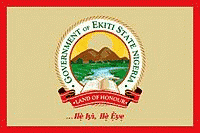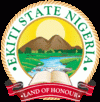Ekiti State (Ekiti State)
 |
 |
One of the smallest states of Nigeria, Ekiti is the 31st largest in area and 30th most populous with an estimated population of nearly 3.3 million as of 2016. Geographically, the state is divided between the Nigerian lowland forests in most of the state and the drier Guinean forest–savanna mosaic in the north. Among the state's nature are false acraeas, mona monkey, forest buffalo, and grey parrot populations along with one of the last remaining Nigeria-Cameroon chimpanzee populations with a troop of about 20 chimpanzees in the heavily threatened Ise Forest Reserve. In March 2022, Ekiti State became the first state in Nigeria to adopt a state tree as one of its official symbols. On World Forest Day 2022, Governor Kayode Fayemi announced that Obeche (Triplochiton scleroxylon) had been chosen as State Tree owing to its local prominence and environmental, economic and cultural significance.
Modern-day Ekiti State has been primarily inhabited for centuries by the Ekiti people, a Yoruba subgroup, with minorities of the Akoko Yoruba subgroup. Religiously, the majority of the state's population (~85%) are Christian with smaller Muslim and traditionalist minorities at about 10% and 5%, respectively.
In the pre-colonial period, the area that is now Ekiti State was at various points ruled by the Oyo Empire, Benin Empire, and finally, the Ekiti states which formed the Ekiti Confederacy in the later half of the 1800s. From 1877 to 1893, the Confederacy fought the Kiriji War led by Fabunmi Okemesi alongside other Eastern Yoruba groups against the Ibadan Kingdom and other Western Yoruba groups; the war ended in a British-brokered stalemate before the area was colonized and incorporated into the British Southern Nigeria Protectorate which later merged into British Nigeria in 1914. After independence in 1960, the area of now-Ekiti was a part of the post-independence Western Region until 1967 when the region was split and the area became part of the Western State. In 1976, the Western State was split and the state's east became Ondo State. Twenty years later, Ondo State's northwest (then termed the Ekiti Zone) was broken off to form Ekiti State.
Economically, Ekiti State is partially based around agriculture, mainly of yams, rice, cocoa, and cassava crops. Key minor industries are logging and tourism. Ekiti has the joint-thirteenth highest Human Development Index in the country and is considered the heart of the homeland of the Ekiti people.
Ekiti was an independent state prior to the British conquest. It was one of the many Yoruba states in what is today Nigeria. The Ekiti people as a nation and districts of Yoruba race trace some of her progeny to Oduduwa, the father and progenitor of Yoruba race even though good reason appear to establish the existence of aboriginal people in Ekiti region prior to influx of royalty from present day Ile Ife as that kingdom grew and abound.
There are two major schools of thought regarding Ekiti history. First was the story that tied the origin of Ekiti to Ife. The story goes that the Olofin, one of the sons of Oduduwa had 16 children and in the means of searching for the new land to develop, they all journeyed out of Ile-Ife as they walked through the Iwo - Eleru (Cave of Ashes) at Isarun and had stop over at a place called Igbo-Aka (forest of termites) closer to Ile-Oluji.
The Olofin, the 16 children and some other beloved people continued with their journey, but when they got to a particular lovely and flat land, the Owa-Obokun (the Monarch of Ijesha land) and Orangun of Ila decided to stay in the present Ijesha and Igbomina land in Osun state. While the remaining 14 children journeyed onwards and later settled in the present day Ekiti land. They discovered that there were many hills in the place and they said in their mother's language that this is "Ile olokiti" the land of hills. Therefore, the Okiti later blended to Ekiti. So Ekiti derived her name through hills.
It must however be noted, that this history may describe the history of certain royalty in present-day Ekiti, but not all of Ekiti which is made up of 131 Principal towns, with their own royalty and many land-owning communities with no royalty at all. In fact, the invading royalties from the East went on to colonize and transform the aboriginals, distinguishing the Ekiti dialect upon mix-up with the Ife/Oyo tongue of the Yorubas according to Samuel Johnson, the renowned historian of early Yoruba States and Affairs
Second school of thought on Ekiti origin is more likely and grounded in actual history. It was said that Oduduwa, the ancestor of the Yoruba traveled to Ife [Ife Ooyelagbo] where he met people who were already settled there. Among the elders he met in the town were Agbonniregun [Stetillu], Obatala, Orelure, Obameri, Elesije, Obamirin, Obalejugbe just to mention a few. It is known that descendants of Agbonniregun [Baba Ifa] settled in Ekiti, examples being the Alara and Ajero who are sons of Ifa. Orunmila [Agbonniregun] himself spent a greater part of his life at Ado. Due to this, we have the saying ‘Ado ni ile Ifa’ [Ado is the home of Ifa]. The Ekiti have ever since settled in their present location.
Map - Ekiti State (Ekiti State)
Map
Country - Nigeria
 |
 |
| Flag of Nigeria | |
Nigeria has been home to several indigenous pre-colonial states and kingdoms since the second millennium BC, with the Nok civilization in the 15th century BC, marking the first internal unification in the country. The modern state originated with British colonialization in the 19th century, taking its present territorial shape with the merging of the Southern Nigeria Protectorate and Northern Nigeria Protectorate in 1914 by Lord Lugard. The British set up administrative and legal structures while practising indirect rule through traditional chiefdoms in the Nigeria region. Nigeria became a formally independent federation on 1 October 1960. It experienced a civil war from 1967 to 1970, followed by a succession of military dictatorships and democratically elected civilian governments until achieving a stable democracy in the 1999 presidential election. The 2015 general election was the first time an incumbent president failed to be re-elected.
Currency / Language
| ISO | Currency | Symbol | Significant figures |
|---|---|---|---|
| NGN | Nigerian naira | ₦ | 2 |
| ISO | Language |
|---|---|
| EN | English language |
| HA | Hausa language |
| IG | Igbo language |
| YO | Yoruba language |















